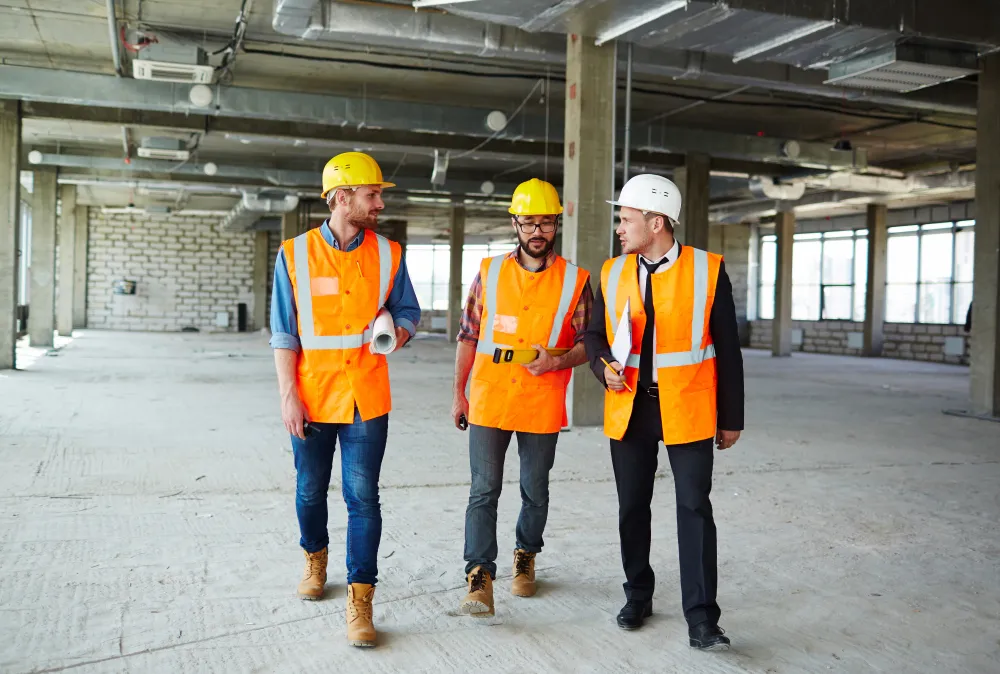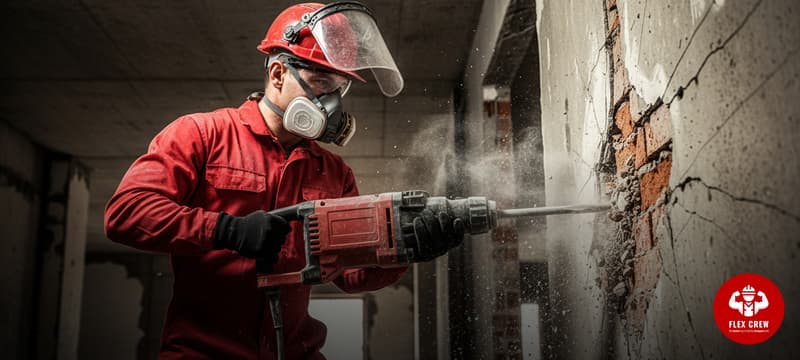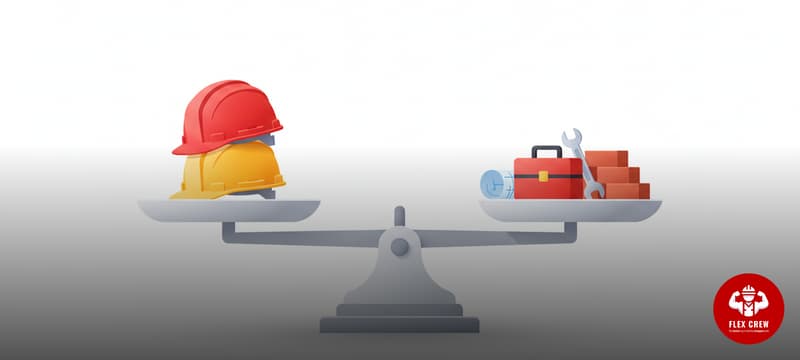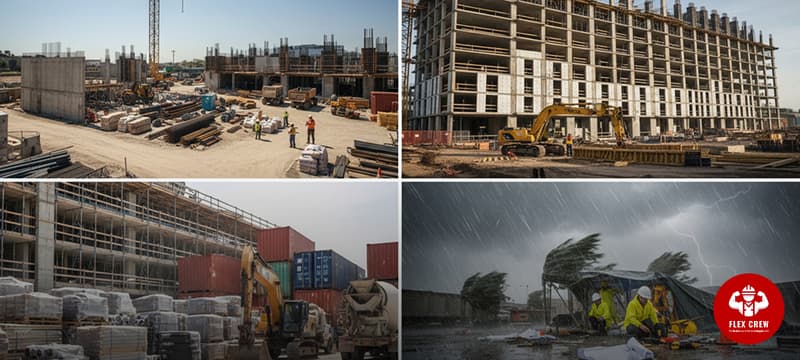When it comes to construction projects, your crew isn't just a collection of workers they're the backbone of your entire operation. Whether you're managing a small residential build or overseeing a massive commercial development, having the right construction crew can make the difference between finishing on time and dealing with costly delays.
Why Construction Crew Quality Matters More Than Ever
In today's competitive construction landscape, project success hinges on one critical factor: people. As industry veterans know, skilled workers drive a company's success or failure. The reality is that a well-assembled construction crew doesn't just complete tasks they solve problems, adapt to challenges, and keep projects moving forward when obstacles arise.

The hidden costs of poor crew selection are staggering. Project delays can cost thousands per day, safety incidents increase insurance premiums, high turnover disrupts team dynamics, and rework due to skill gaps eats into profits. When you consider that the construction industry faces a significant labor shortage, with 62% of contractors experiencing difficulty finding skilled workers, the importance of building strong crew relationships becomes even more critical.
What Makes a High-Performance Construction Crew?
Experience Meets Reliability
The best construction crews combine technical expertise with dependable work ethics. When you're working with tight deadlines and complex specifications, you need workers who can hit the ground running. This means craftsmen who understand not just how to use tools, but how to read blueprints, follow safety protocols, and communicate effectively with supervisors.
Modern construction projects demand workers who can adapt quickly to new environments and challenges. The most valuable crew members are those who bring both technical skills and problem-solving abilities to every job site. They understand that construction is about more than just following instructions it's about anticipating issues, suggesting improvements, and maintaining quality standards throughout the project lifecycle.
Diverse Skill Sets for Complex Projects
Today's construction projects require increasingly diverse talents. Your ideal construction crew should include skilled tradespeople with specialized certifications, general laborers who can adapt to various tasks, equipment operators familiar with modern machinery, and safety-conscious workers who prioritize job site security.
The construction industry has evolved significantly, with new technologies and methods requiring continuous learning. Crews that embrace ongoing education and skill development become more valuable assets. Cross-trained workers provide flexibility when project needs change, allowing you to adapt to unexpected challenges without bringing in entirely new teams.
Cultural Fit and Team Chemistry
Here's something many contractors overlook: crew chemistry matters. Workers who communicate well, support each other, and share a commitment to quality will outperform a group of individually skilled but incompatible workers every time. This is particularly important in diverse work environments where effective communication can make or break a project.
Progressive companies recognize that diversity strengthens their crews. Hispanic workers, for example, bring valuable skills and strong work ethics to construction projects. However, language barriers can create challenges in communication and safety training. Smart staffing approaches address these challenges by providing bilingual support, offering English language training programs, and creating inclusive workplace environments.
The Staffing Partnership Advantage
Building relationships with experienced staffing providers transforms how you approach crew management. Instead of scrambling to find workers when projects ramp up, you can rely on partners who understand your specific needs, compliance requirements, and timeline pressures.
True partnership means your staffing provider knows your project scope and complexity levels, required certifications and safety training, the pace and work environment expectations, and your company culture and values. This deep understanding leads to better matches, smoother onboarding, and longer employee retention all crucial factors for project success.
The most effective staffing relationships are built on mutual understanding and shared goals. When staffing providers truly understand your business, they become an extension of your team rather than just a vendor. This partnership approach helps ensure that every worker placed on your job site is not just qualified, but also aligned with your project objectives and company values.

Best Practices for Construction Crew Management
Start with Clear Communication
Before your construction crew sets foot on site, ensure everyone understands the project scope, safety requirements, and quality standards. Regular briefings and check-ins keep everyone aligned and prevent costly misunderstandings. Effective communication also involves creating feedback loops where crew members can share insights and suggestions based on their on-site experience.
Invest in Safety Training
A safe crew is a productive crew. Comprehensive safety training not only protects workers but also reduces project delays caused by accidents and regulatory issues. Make safety training an ongoing priority, not a one-time event. The first two to four weeks on the job usually involves heavy training and job site safety orientation regardless of skill level, so investing in quality safety programs pays dividends throughout the project.
Foster Team Development
Encourage skill development and cross-training within your construction crew. Workers who can handle multiple tasks provide flexibility when project needs change, and ongoing training demonstrates your investment in their careers. This approach also helps with retention, as workers who feel valued and see opportunities for growth are more likely to stay with your company long-term.
The Economics of Quality Crew Selection
While it might seem cost-effective to hire the cheapest available workers, this approach often backfires. Quality construction crews deliver value through reduced rework costs, faster project completion, improved safety records, and enhanced reputation that leads to repeat business and positive referrals.
The median annual wage for construction laborers and helpers was $46,050 in May 2024, though rates vary significantly by location, skill level, and specialization. In today's competitive market, you need a competitive pay structure and attractive benefits package to attract skilled workers. Remember, the baseline is having a competitive compensation package if you're not competitive on pay and benefits, you'll struggle to attract quality crew members.
Planning for Seasonal Demands and Future Growth
Construction workflows often follow seasonal patterns, with peak demand during favorable weather months. Smart contractors plan ahead by building relationships with reliable staffing partners, identifying core crew members for year-round retention, developing flexible staffing strategies for peak periods, and cross-training workers to handle multiple roles.
The construction industry continues evolving, with new technologies and changing workforce dynamics. Successful companies adapt by embracing diverse talent pools, investing in worker development, and partnering with staffing agencies that understand these changing needs. Emerging trends include increased focus on worker retention and career development, integration of technology in daily operations, and growing emphasis on sustainable and efficient practices.
When you're ready to build a construction crew that delivers results, focus on finding partners who understand your industry, respect your standards, and share your commitment to excellence. Because in construction, great projects start with great people.
Frequently Asked Questions About Construction Crews
How do I find qualified construction crew members quickly?
Partner with a construction staffing agency that maintains databases of pre-vetted skilled candidates ready for immediate deployment.
What should I look for when hiring construction workers?
Focus on relevant experience, safety consciousness, blueprint reading skills, physical fitness, and strong teamwork abilities.
How can I improve construction crew retention?
Offer competitive compensation, comprehensive safety training, clear communication, and opportunities for advancement within your company.
Should I use temporary or permanent construction workers?
Temporary construction staffing addresses the need for a flexible workforce that can adapt to project-specific demands, especially for varying project loads.


